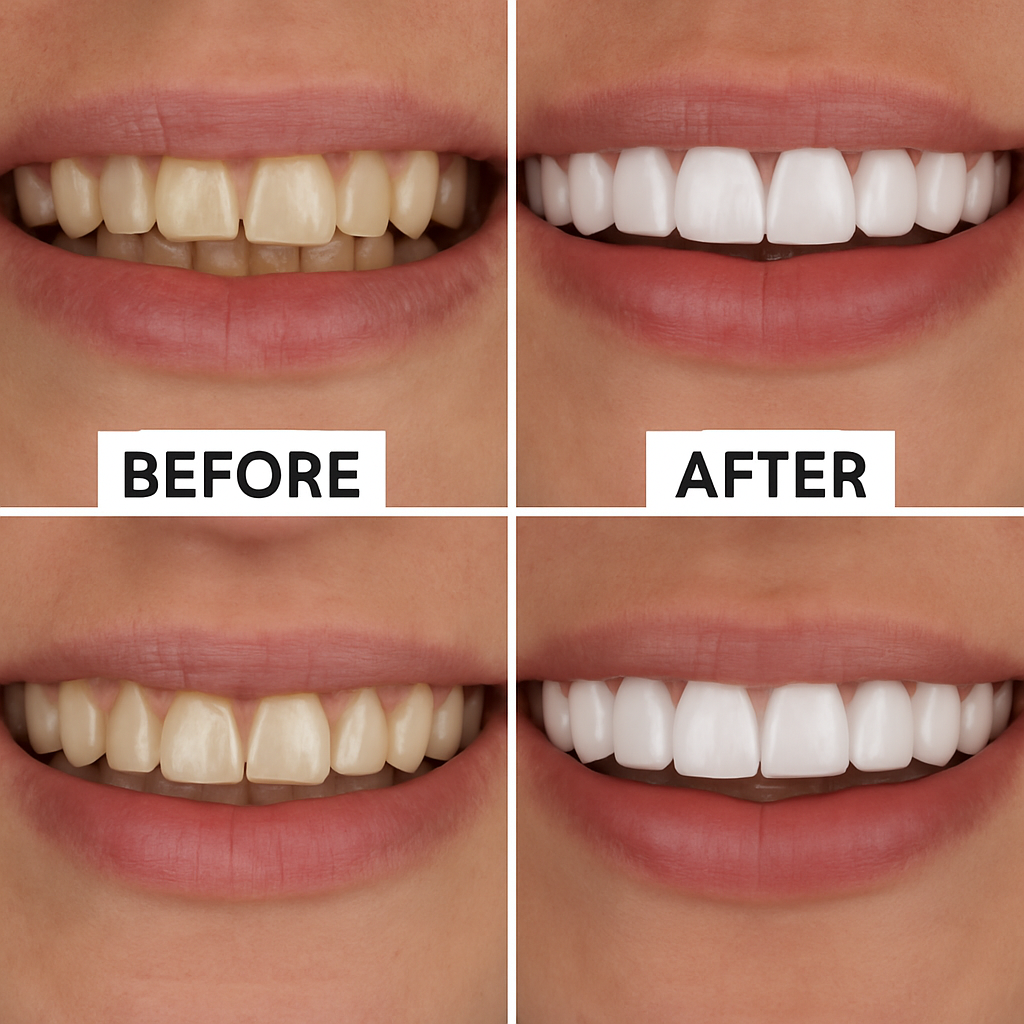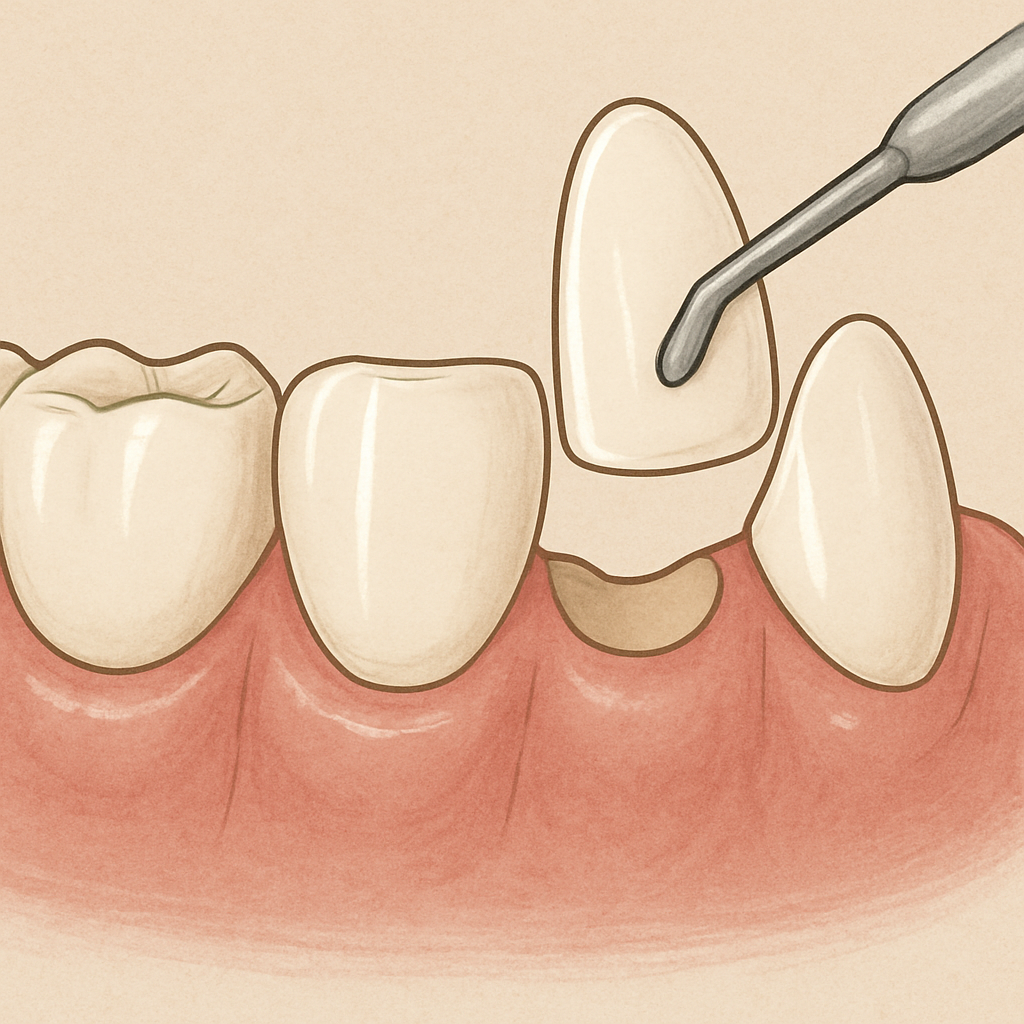
Dental veneers are thin, custom-made shells designed to cover the front surface of your teeth. They are typically made from porcelain or composite resin materials and are intended to improve the appearance of your teeth by altering their color, shape, size, or length. Veneers are a popular choice for those looking to enhance their smile without undergoing more invasive procedures like braces or crowns. They provide a versatile solution to a range of cosmetic dental issues, from discoloration and minor misalignment to gaps and chips.
There are mainly two types of veneers: porcelain veneers and composite resin veneers. Each type has its own advantages and considerations, making it important to evaluate which option best suits your needs and lifestyle.
- Porcelain Veneers: Known for their durability and natural appearance, porcelain veneers resist stains better than composite veneers. They mimic the light-reflecting properties of natural teeth, making them a popular choice for those seeking a more permanent solution. Porcelain veneers are custom-designed to fit your teeth precisely, requiring a skilled dentist to ensure an optimal fit and a seamless appearance. Their resilience against everyday wear and tear makes them a long-lasting investment, often lasting over a decade with proper care.
- Composite Resin Veneers: These veneers are generally less expensive than porcelain veneers and can be applied in a single dental visit. They are, however, more prone to staining and typically don’t last as long as their porcelain counterparts. Composite veneers are a more flexible option, allowing for easier repairs if they become damaged. They can be a good choice for those looking for a quicker, more cost-effective cosmetic enhancement, although they may require more frequent maintenance and replacement over time.
The Veneer Application Process
Before diving into what happens to your teeth under veneers, it’s essential to understand the application process itself. This process is integral to achieving the desired aesthetic results and ensuring the longevity of the veneers.
Initial Consultation
The veneer application process begins with an initial consultation. During this visit, your dentist will discuss your cosmetic goals, examine your teeth, and determine whether you’re a good candidate for veneers. X-rays and impressions of your teeth may also be taken. This consultation is a critical step, as it allows your dentist to identify any underlying dental issues that need to be addressed before veneers can be applied. It’s also an opportunity for you to discuss any concerns or questions you may have about the procedure.
Preparation of Teeth
To apply veneers, your dentist will need to prepare your teeth. This involves removing a small amount of enamel from the surface of each tooth that will receive a veneer. This is done to ensure the veneers fit properly and look natural. The amount of enamel removed is typically minimal, often less than a millimeter. This preparation process is crucial, as it allows the veneers to sit flush against your teeth, creating a natural appearance and preventing issues such as misalignment or discomfort. While the thought of enamel removal may be daunting, it’s important to remember that this step is carefully controlled and performed with precision to maintain the health and integrity of your teeth.
Making the Veneers
Once your teeth are prepared, impressions are taken and sent to a dental laboratory, where your custom veneers are crafted. This process can take a few weeks, during which temporary veneers may be placed to protect your teeth. The crafting of veneers is a meticulous process, involving the selection of materials that best match the color and translucency of your natural teeth. The lab technicians work closely with your dentist to ensure the final product meets your specific aesthetic goals and fits perfectly within your mouth.
Bonding the Veneers
When your custom veneers are ready, you’ll return to the dentist for their application. The veneers are carefully bonded to your teeth using a strong dental adhesive. Your dentist will make any necessary adjustments to ensure a perfect fit and natural appearance. This bonding process is critical to the success of the veneers, as it ensures they remain securely attached and function like natural teeth. The adhesive used is specially formulated to provide a durable bond while being safe for oral use. Once the veneers are in place, your dentist will polish them to enhance their appearance and ensure they blend seamlessly with your natural teeth.
What Happens to Teeth Under Veneers?
Now that you understand the veneer process, let’s address what happens to the teeth beneath them. Understanding this aspect is essential for making an informed decision about whether veneers are the right choice for you.
Protection and Preservation
One of the primary benefits of veneers is the protection they offer to your natural teeth. The thin layer of porcelain or composite resin acts as a barrier, shielding your teeth from damage and decay. However, it’s essential to maintain good oral hygiene, as the natural teeth beneath the veneers are still susceptible to decay and gum disease. Regular brushing and flossing, along with routine dental check-ups, are crucial to preserving the health of your teeth under the veneers. The protective nature of veneers can also help prevent further damage to teeth that may have been weakened by previous dental issues.
Alteration of Natural Teeth
The application of veneers requires the removal of some enamel from your natural teeth. This process is irreversible, meaning that once you have veneers, you will always need them or another form of restoration to protect your teeth. It’s crucial to consider this permanency before deciding on veneers. While this alteration may seem significant, the benefits of veneers in terms of aesthetic enhancement and functional improvement can outweigh the drawbacks for many individuals. Discussing your long-term dental goals with your dentist can help you weigh the pros and cons effectively.
Strengthening Effect
While veneers themselves are not intended to strengthen teeth, they can have a positive effect on the structural integrity of teeth that are chipped or worn down. By covering damaged surfaces, veneers can prevent further wear and provide additional support. This strengthening effect can be particularly beneficial for individuals with teeth that have been compromised by previous dental work or injury. Veneers can help restore confidence in your smile by not only improving its appearance but also enhancing the overall stability of your teeth.
Sensitivity Changes
Some patients experience increased tooth sensitivity after getting veneers due to the enamel removal process. This sensitivity is usually temporary and can be managed with toothpaste designed for sensitive teeth. It’s important to communicate with your dentist about any discomfort you experience, as they can offer solutions to alleviate sensitivity. Over time, most patients find that their teeth adjust to the veneers, and sensitivity diminishes. Being proactive about managing this aspect can ensure a smoother transition to having veneers.
Caring for Your Veneers
To ensure the longevity and effectiveness of your veneers, proper care is essential. Here are some tips for maintaining your veneers and the health of your natural teeth. These practices are not only about preserving the aesthetic appeal of the veneers but also about maintaining overall dental health.
Oral Hygiene
Brush and floss your teeth regularly to prevent decay and gum disease. Use a non-abrasive toothpaste to avoid damaging the veneers. It’s important to be diligent about oral hygiene, as veneers do not protect against gum disease or cavities in the natural teeth. Regular oral care helps maintain the bond between the veneers and your teeth, ensuring they remain secure and effective.
Regular Dental Check-ups
Visit your dentist regularly for professional cleanings and check-ups. This will help maintain the health of your veneers and catch any potential issues early. Regular visits allow your dentist to monitor the condition of your veneers and the health of your teeth and gums. Early detection of any problems can prevent more serious issues from developing, saving you time and money in the long run.
Avoiding Bad Habits
Refrain from biting your nails, chewing on ice, or using your teeth as tools, as these actions can damage both your veneers and natural teeth. Breaking these habits can help extend the life of your veneers and prevent unnecessary wear or breakage. If you’re prone to grinding your teeth, consider using a night guard to protect your veneers while you sleep.
Dietary Considerations
While porcelain veneers are resistant to staining, it’s still a good idea to limit the consumption of foods and drinks that can stain, such as coffee, tea, and red wine. Being mindful of your diet can help maintain the brightness and appearance of your veneers. Additionally, limiting acidic foods and beverages can help prevent damage to the veneers and the underlying teeth.
Conclusion
Dental veneers offer a transformative solution for those looking to improve their smile. By understanding the process and what happens to your teeth under veneers, you can make a well-informed decision about whether they are right for you. Remember, while veneers protect and enhance your teeth, maintaining good oral hygiene and regular dental visits are essential to ensure their longevity and your overall oral health. With the right care and consideration, veneers can be a valuable investment in your dental aesthetics and confidence, providing a lasting positive impact on your life.








Leave a Reply
You must be logged in to post a comment.